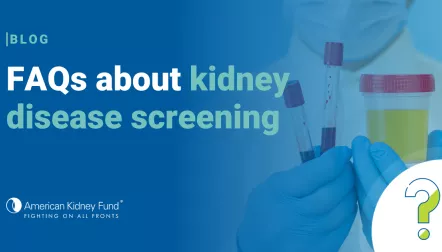
Blog post
Anemia, kidney disease and your heart: It is time to have the conversation
Your kidneys perform many necessary functions in your body, in addition to filtering waste and extra fluid. For instance, your kidneys produce hormones that regulate your blood pressure and help your body make red blood cells — both of which affect your heart.

When you have kidney disease and your kidneys cannot perform their important functions properly, you may develop anemia, a common condition that happens when there are not enough red blood cells in your body. Kidney disease puts stress on your entire cardiovascular system, which includes your heart, blood and blood vessels. Over time, it can severely impact all three and can ultimately lead to heart failure. Heart disease is a leading cause of death among people with kidney disease and is the top cause of death for people on dialysis. Anemia also increases the risk of heart disease and can make kidney disease worse.
February is American Heart Month, and the American Kidney Fund (AKF) is recognizing the important connection between kidney disease and heart disease by sharing the results of our nationwide survey of people living with kidney disease and kidney care practitioners. We will use the findings to help guide our ongoing anemia education efforts through our ACT on Anemia campaign.
We found that 99% of practitioners (nephrologists, nurses, nurse practitioners and physician assistants) believe anemia is a significant health issue for people on dialysis. Despite this, nearly 1 in 5 people on dialysis and living with transplants could not recall having a conversation with their practitioner about anemia, nor did they understand the relationship between anemia and kidney disease. Just 37% of people living with kidney disease said a practitioner discussed anemia treatment options with them. Of those who did discuss treatment options with a practitioner, 73% understood why they were being treated for anemia, compared to only 42% of those who did not have that discussion.
Those statistics are a cause for concern.
Given the high rates of anemia among people living with kidney disease, it is important that they have a full understanding of anemia and be empowered to actively make decisions about their anemia treatments. We were encouraged to find that anemia is being discussed between people with kidney disease and their practitioners, but it is clear from our survey results that we must all do better to improve communication. If you are concerned about anemia or want to learn more, we have developed a guide on how to talk with your doctor about anemia. You can also watch this archive of our recent webinar, "Tips for talking with your doctor," which lets people with kidney disease know how to start a conversation about your health and what questions you should ask at every visit.
To see all the findings of our anemia survey, visit our survey results page to download the full report.
Remember: your kidneys and heart are interconnected, and kidney disease, heart disease and anemia are all related. So, if you have kidney disease, talk to your doctor about treatments for anemia and ways to protect your heart.
To learn more about the connection between anemia and kidney disease, check out ACT on Anemia.





